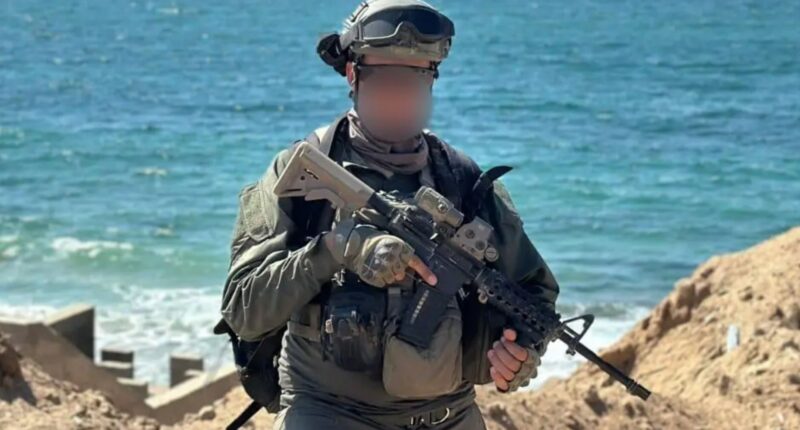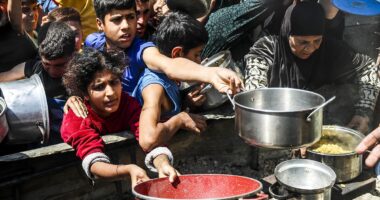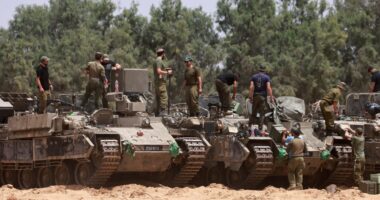THE grandson of a Holocaust survivor has told how he gave up his “comfortable” life in the UK to join Israel’s military.
Captain U, 33, served in the search and rescue unit – helping anyone who needs it, even terrorists – and is now a reservist.



During the chaos on October 7, he guided his friend over the phone on how to create a tourniquet to help his friend’s companion who got shot in the leg while evacuating with his family.
“As a paramedic, or any medical field, the number one rule is you help anyone, no matter who they are,” he told The Sun.
“We help everyone. It’s not our job to judge.”
Manfred Goldberg, the grandfather of Captain U, was originally from Kassel, a city in central Germany. He managed to find safety in the United Kingdom after surviving the atrocities of the Holocaust, a dark period during which six million Jewish individuals lost their lives.
Inspired by his grandfather’s story and his family’s history, Captain U left what he described as a “comfortable” life in Britain to move to Israel.
He told The Sun: “When I was 18, I decided to go to Israel for my gap year.
“I was volunteering for MDA [Magen David Adom], which is the ambulance service in Israel, during the year I decided I wanted to move to Israel.
“[The decision was] largely based on my family’s history and my grandfather’s experiences, and Israel being the Jewish homeland.”
At the onset of World War Two in September 1939, a courageous nine-year-old Manfred, along with his mother Rosa and his five-year-old brother Herman, found themselves stuck in Germany, facing a perilous situation.
In December 1941, they were given just ten minutes to pack before being transported on a crammed train for three days to an overcrowded ghetto in the Latvian capital Riga.
Jews had to live 25 to a house, and Manfred, by this time 11, was known only by the number 54678 and on a starvation diet.
The family endured the horrors of six concentration camps and Manfred was forced into slave labour.
Tragically one day as Manfred and his mother worked, Herman was taken away by the SS and was never seen again.
Goldberg was moved to Stutthof, a camp near the Polish city of Gdansk whose front gate became known as the Gateway of Death because so few inmates left alive.
In a final horror twist, just as the war was drawing to a close, Manfred and his mother were marched 25 miles northwest, where hundreds of prisoners were herded onto barges and held offshore for days without food or water.
Remarkably, when the SS guards disappeared, the stronger prisoners ripped up planks and used them as oars to paddle the massive boats back to shore.
But just as the inmates landed, the guards returned.
First they shot those too weak to escape, and then rounded up those who had made it to shore, including Manfred and his mother, and started marching them back to Germany.
Thankfully, a British tank column then arrived and the Nazis fled – and Manfred and his mum were reunited with his father Benno who escaped to the UK.


Manfred, now 94, forged a career as an engineer, married and had four children – but refused to tell his story for more than 50 years.
Captain U said: “Growing up, we didn’t hear about my grandfather’s story until one Tisha, which is one of the saddest days in Jewish history, he was asked to speak in a local synagogue.
“Suddenly he started talking, and no one had ever heard him speak before – including his children and grandchildren.
“I think there are two kinds of survivor. There are survivors who when they left wherever they were and reached another place, they stayed in survivor mode.
“He was never like that. His friends and family didn’t know what he’d gone through. He built a life for himself.”
Inspired by his grandfather, Captain U – who grew up in Hendon, London – moved to Israel and joined the IDF in 2011 and hasn’t looked back.
Captain U began as a soldier in the search and rescue unit before training to become a combat medic.
After Hamas swept across the Gaza border on October 7, 2023, killing at random and taking more than 250 hostages, Captain U has been in reserve service based in Jerusalem.
He told how on what was one of Israel’s darkest days, he rushed his wife and three-month-old baby to safety knowing he would be called up within minutes.
“I remember the decisions I had to make,” Captain U said.
“My car was, I think, half full of petrol. I was like, do I stop now in a petrol station with my wife and child in the car, or do I carry on to the centre or the south where it’ll be more dangerous and fill up there without them in the car.


“And then my friend called me, and she had another friend on the line who had been shot in the leg and was in an ambulance and couldn’t get through to the ambulance service.
“I had to give her directions to make a tourniquet to stop the bleeding while driving my wife and child in the car.
“She did stop the bleeding and saved her life.”
As well as his day job, Captain U can be called up at any moment.
“We have two roles,” he said.
“Our main role is the search and rescue, so whenever there’s a threat of rockets and buildings being destroyed by rockets, or earthquakes, we have a rescue role where I work on those sites.
“And now because of the stress and the amount of work the army has, we also do guard duty, so keeping the border safe.
“We’re based in an area where there are a lot of incidents, stone throwings, firebombs, shootings. But also responding to car accidents, just kind of a more medical role.”
Captain U stressed that his job is to help anyone who needs it – no matter their background.
“The number one rule is you help anyone, no matter who they are,” he said.
“Jewish, non-Jewish, Christian, Muslim, Palestinian, terrorist, or the victim of a terror attack – we help everyone.
“It’s not our job to judge or to execute.”
Captain U said he has no plans to return to the UK despite still having family in London.
“I’m proud [to serve in the IDF]. I know my mother is very proud,” he said.
“I think a lot of Israelis see serving in the army as a duty and responsibility, but don’t realise it’s a privilege as well.”
The dad-of-one also admitted that despite the ongoing conflict, he feels much safer in Israel.
“I like to quote my grandfather,” Captain U said.
“My grandfather, who was in Israel on October 7, said he felt he felt safer in Israel on October 7 than what he feels in the UK since then.
“He’d be happy walking on the streets alone here in Israel than in Hendon, which is predominantly Jewish area as well, because of the anti-Semitism.
“I feel a lot safer [in Israel], even when I’m not with my wife and child.
“I feel safer for them when they’re there at home or with her family than when we go abroad or back in England.
“We go back to England to visit my family, but I don’t have any plans to go back.”
The horrors of Holocaust
ONE of the greatest atrocities in world history, the Holocaust cost the lives of millions of Jews across Europe.
The genocide was carried out largely during World War 2, with the rise of Nazi Germany as victims were persecuted, tortured and killed on an industrial scale.
But not only Jews were targeted under Hitler’s regime – Romanis, homosexuals and Jehovah’s Witnesses were also on Hitler’s list.
It is estimated around 6 million Jews died in the Holocaust.
The targets were either killed on the spot, drafted to forced labour camps, or sent to concentration camps.
The camps saw millions of innocent men, women and children murdered in gas chambers.
Or they died of starvation or illnesses.
The notorious Auschwitz camp would become the grave of at least 1.1 million people.
The horrors started when Adolf Hitler rose to power in 1933 and passed antisemitic laws in a bid to force German Jews to emigrate.
And things became even more hellish after the occupation of Poland in 1939.
The nightmare came to an end after the UK, US and the rest of the Allies won the war and liberated the survivors from the remaining death camps in 1945.
Senior Nazi members were prosecuted during the Nuremberg trials with the first tribunal trying 23 political and military leaders.
Adolf Hitler, Heinrich Himmler and Joseph Goebbels, were excluded as they had committed suicide several months before.
January 27 marks Holocaust Memorial Day – which is the anniversary of the liberation of Auschwitz.

















